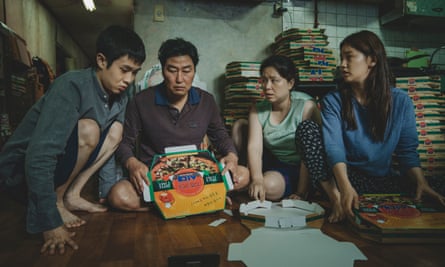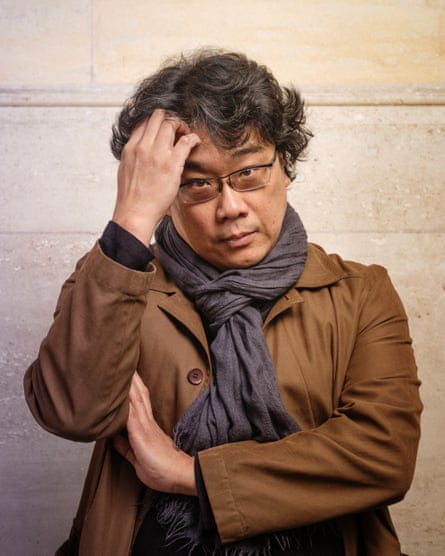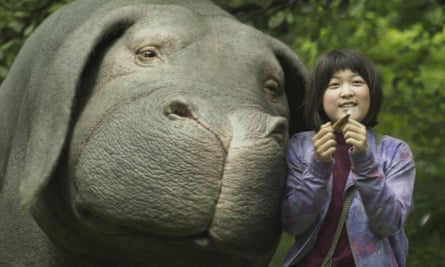The past year has been a whirlwind for Bong Joon-ho, and he is still in the midst of it. His movie Parasite has whisked him to places few directors – and certainly no South Korean director – have been before. It started with winning the top prize at the Cannes film festival last May, and the momentum has not let up: critical adulation, box office success, US talkshow appearances and a ridiculous 170 awards and counting.
And not just not just awards in the “foreign film” categories; Parasite is the first foreign-language film to win the Screen Actors Guild’s coveted ensemble performance award. It is also up for six Oscars, including best picture and best director. Before, it was only connoisseurs who appreciated Bong’s singular output – including Donald Glover, Edgar Wright, Guillermo del Toro and Quentin Tarantino. Now there’s a whole online “#BongHive” sharing memes, news and general love about the 50-year-old film-maker. He’s this season’s must-have selfie for Hollywood stars to brandish on Twitter. Even Bong’s ever-present interpreter, Sharon Choi, has become a minor celebrity.
Bong has kept his feet on the ground throughout. He brought his eight-minute standing ovation at Cannes to a close because he was hungry. Similarly, he described the Oscars as no big deal because they are “not an international film festival. They’re very local.”
When we meet in London on a rainy, wintry morning, Bong is looking pretty windswept. His bouffant mop of hair is just about back in place, but he is wrapped in a big scarf, and has a cough. “The most difficult part has been the double, triple jetlag,” he – or rather Choi – says. Bong understands English and speaks it a little, but prefers to answer in Korean, trusting her to translate the nuances. “Physically, it has been really horrible but right now I’m doing good.”
Bong is no wide-eyed ingenue, though. His two preceding films, 2017’s Okja and 2013’s Snowpiercer, both effects-heavy sci-fi tales, were primarily in English and featured the likes of Chris Evans, Tilda Swinton, Jake Gyllenhaal and Ed Harris. He loves British and Irish actors, he says, not to mention British cinema – he claims to have watched Hitchcock’s Psycho at least 50 times. He has also been around the Hollywood block long enough to have had a run-in with Harvey Weinstein – of which more later.
The irony that Bong has scored his biggest success by returning to his native country and tongue is not lost on him. “I actually came up with this idea back when I was working on Snowpiercer,” he says. “It wasn’t as if I was motivated to return to Korea and do a Korean-language film, although I did want to pack this film with very Korean details.” There is a great deal of local specificity in Parasite, from its reference to a craze for opening Taiwanese pastry shops to an invented dish of packaged instant noodles mixed with sirloin steak (which has, of course, become a real-life trend), but Parasite is that rare “local” film that has struck a resounding global chord.

Parasite is a story full of spoilable surprises. Suffice to say, the setup contrasts two Seoul families at opposite ends of the class ladder. The Kims (led by Bong’s regular lead actor, Song Kang-ho) live in a semi-basement hovel in an alley that doubles as a public toilet; the Parks live in a minimalist palace on a Seoul hilltop. Things kick off when the son, Kim Ki-woo, becomes an English tutor to the Parks’ teenage daughter. Sensing an opportunity, the Kims set about replacing the Parks’ domestic staff one by one, pretending not to know each other. But, needless to say, the plan does not come off perfectly.
“Korea, on the surface, seems like a very rich and glamorous country now, with K-pop, high-speed internet and IT technology,” Bong says, “but the relative wealth between rich and poor is widening. The younger generation, in particular, feels a lot of despair.” Just as there are people living in tents just around the corner from where we are in central London, so there are homeless people sleeping rough around Seoul’s central station, he says. “People who are in society’s blind spots.”
Parasite is not a simple tale of rich v poor. No one is totally innocent or guilty. Bong describes the film as “neutral”. He points out that Mr Park, whom he likens to Mark Zuckerberg, accrued his wealth through honest hard work. “He’s not particularly greedy, it doesn’t feel like he became rich by doing bad things.” At the same time, though, the Parks repeatedly express their contempt for the lower classes, even complaining that they smell different.
But the hard-up Kim family are also hard-working, albeit to more devious ends, and, in contrast to the atomised Park family, they are very unified. “That was one of the things I wanted to talk about with this film,” Bong says. “It’s not as if they have shortcomings or they are lazy. It’s just that they can’t get proper jobs.” He references a conversation in the film about how 500 college graduates applied for a single job as a security guard. “That’s not an exaggeration; it’s based on a real article I read.”
In that sense, Parasite could be taken less as a criticism of the class system than a “neutral” interrogation of the whole capitalist system. Is exploitation an inevitable outcome? Is there a better alternative? “People have to maintain mutual respect towards each other,” says Bong. “And this film deals with a situation where that minimal amount of respect you should have towards another human being is completely destroyed and ignored.”

Bong is as fascinated and baffled as anyone by how Parasite has taken off. “A lot of people say it’s a universal story because it’s about the gap between rich and poor, but I don’t think that’s all the answer,” he says. “I think this film has done so well because it appeals in a very cinematic way, as a film in itself. I really want to take time to look back at what that cinematic appeal was.”
Parasite isn’t just a great story; it is a great story brilliantly told. The pieces all seem to fit together: the performances, the structure, the meticulous design, the symbols and symmetries. The visual storytelling is so fluent, it barely needs subtitles, and Bong throws in a few of his trademark slow-motion scenes of extreme mayhem. But one of the director’s defining characteristics, for which the #BongHive adore him so much, is his uncanny ability to switch between tones and genres most western film-makers regard as mutually exclusive – often within a single scene. Parasite defies categorisation. It is a family drama, a black comedy, a suspense thriller, a class satire, even a domestic horror. That Hitchcock influence is clearly detectable, as are many others, but he has created a genre that is his own.
Social division is a theme that runs through much of Bong’s work, and, despite his avowed neutrality, he tends to favour the underdogs. His 2006 film, The Host, for example, also focused on a poor but loving family running a food stall, again led by Song. They take on a mutant fish-monster accidentally created by pollution from the US military in Seoul’s Han River. In Okja, it was a down-to-earth country girl who battles a dystopian corporation to save her only friend, a strangely adorable giant mutant pig. Snowpiercer, adapted from a French graphic novel, stages a class revolt on board a train containing the entire postapocalyptic population of the world – a horizontal counterpart to Parasite’s vertical class stratification. Chris Evans leads an assault by the have-nots at the rear on the privileged passengers dwelling at the front.
It was Snowpiercer, incidentally, that led to Bong’s run-in with Weinstein. The disgraced mogul acquired distribution rights to the film in 2012. Bong knew in advance of Weinstein’s “Harvey Scissorhands” reputation, and, sure enough, the producer chopped 25 minutes out of Snowpiercer. But Bong pushed back. At one stage, to retain a scene involving fish-gutting, he invented a lie about how the scene had personal meaning because his father was a fisherman. After bad test screening results for Weinstein’s cut, the mogul ultimately went with Bong’s original version, although it never had a UK release. Bong had no personal relationship with Weinstein to speak of, he says. Or, if he did, he would rather not get into it. “Because he was so high up and busy, I didn’t get to see him often. I only met him a couple of times in his editing room and in his office.”
Bong’s father is actually an art teacher. He places himself in the middle of Korea’s social ladder. “I grew up in a middle-class family. Even in terms of real estate, the house that I grew up in is in the middle – between the semi-basement home and the rich house you see in the film. I was really close with friends and relatives from both classes.” Parasite was inspired by his own experience tutoring a boy from a much wealthier family – at the introduction of his then-girlfriend, who was already tutoring the boy in English.
Surely after the success of his movies, Bong must be pretty well-off himself these days? “I’m not that rich!” he laughs. “I live in an apartment on the ninth floor. In terms of size, it’s probably around a quarter of the size of the house in the movie. Of course, my films did make a lot of money, but I don’t know if you could call me rich if you just look at my place in society.”

Bong first came to international prominence in the early 00s as part of a wave of exciting new directors emerging out of South Korea, including Park Chan-wook (whose Oldboy also won a prize at Cannes), Lee Chang-dong, Kim Jee-woon and Kim Ki-duk. As with Bong, these film-makers seemed to have something fresh to offer. The stories were often dark and gruesome, but told with technical finesse, clearly influenced by Hollywood as well as Asian cinema, and unafraid to switch up tone and genre.
Bong’s second movie, Memories of Murder, was based on the real-life hunt for a serial killer in the 1980s, who had never been caught. It is a window on to how different life must have been in the South Korea of his childhood: military dictatorship, civil unrest, inadequate public services. Under permanent threat of attack from the North, schools hold drills for gas attacks, and whole towns are subjected to “blackout drills” at night. Bizarrely, the real-life killer was recently brought to justice. “One of his cellmates said he watched the movie a couple of times, but we don’t know if that’s true.”
Even within this grim premise, Bong finds moments of absurd comedy in the police investigators’ incompetence. “It’s not as if we were trying to make the audience laugh; it just really reflects the absurdity of Korea in the 1980s,” says Bong. “The laughter has a tinge of sadness to it.” It is a similar story with Parasite, he suggests. “It reflects that absurdity of our current times. The foolishness of this era of polarisation.”
Perhaps this is a particularly Korean state of mind? “There is this collective anxiety,” he says. “Because war and separation of families, these are not abstract ideas to us. Even my mother’s sister in the North. These basic units of society and family are damaged, and Korea has spent decades with those consequences. So there’s a unique hysteria prevalent in Korean society.”
Whether or not it is a national trait, that element of bittersweetness seem to run through all of Bong’s work. It is never one thing or the other; it’s usually both, from Parasite’s steak-and-instant-noodle recipe to slapstick comedy in the face of serial killers and nuclear annihilation. Even Parasite’s world-conquering victory lap Bong regards with a level-headed ambivalence: “It’s kind of like a side job for me as a director,” he says. “My main job is not promoting a film, it’s writing scripts, and, of course, I’m doing that right now, in hotel rooms and on flights, but it hasn’t been easy. So there’s a duality with this entire process. Of course, it’s great and exciting, but I’m also desperate to return to my main job as soon as possible.”
Parasite is released in the UK on 7 February, with a nationwide preview featuring a live streamed Q&A with Bong Joon-ho on 3 February

Comments (…)
Sign in or create your Guardian account to join the discussion